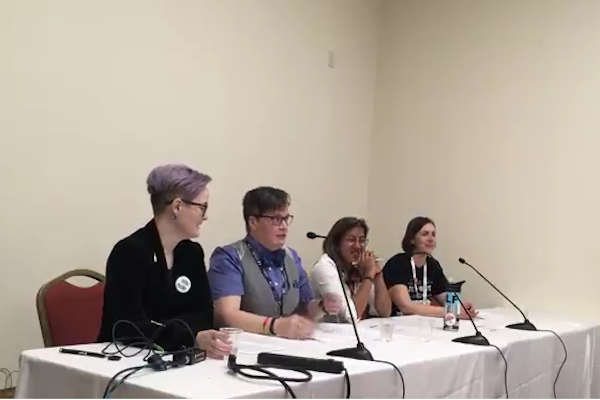ClexaCon, the annual convention dedicated to improving the portrayal of LGBTQ women in media, hosted almost one hundred panels over a three day period. Artists, writers, actors, producers, and their fans gathered in Las Vegas the first weekend in April to talk about stories made in our own image. For those of us who couldn’t attend this year, Tagg presents a sampling brought to you in a four-part Panel Highlights series.
“The Responsibility of Media Makers” panel was a follow-up discussion from the previous year’s “Ethics and Storytelling” panel. Gretchen Ellis (Managing Editor, Fandomentals) moderated, with Dr. Elizabeth Bridges (professor, Rhodes College), Maya Reddy (professional golfer), and Bridget Liszewski (Editor-In-Chief, TV Junkies) as panelists.
As we are well aware, representation of LGBTQ women is not always done responsibly on film or in writing. Ellis opened the panel on that point, bringing up that the impact of a piece of work is more important than its intent, because all we have to interpret a piece of media is the media itself. We do not have the benefit of the author’s intent. If the impact of a movie or novel is that the LGBTQ community feels ignored or dispensable, then that is more telling–and more powerful–than representation for its own sake. Ellis commented, “Those are the kinds of things that send a message, that our stories aren’t worthy.”
Reddy agreed on this point, and turned to how media makers can create more honest content. “The information on queerness for women isn’t very accessible [outside the community]… so how do we make it more accessible for showrunners who aren’t queer women?” If writers are looking for examples of cis gay men’s culture, they can look to the both Queer Eye shows, or to Queer as Folk. For women in the LGBTQ community however, content creators do not have as many samples to choose from.
One of the ways that we can make our own culture more accessible is to write, direct, and produce our own material. We must tell our own stories, and we must be allowed to tell them across the board. Bringing in diverse voices to a writer’s room for a TV show can flesh out characters that might otherwise exist as harmful or tired tropes. Liszewski jumped in, adding that to assume, “‘Well the fans are aware that this character was queer’ doesn’t take the place of actual representation.”
So what does responsibility look like in media? “Normalization,” argued Ellis. “You can’t write a stereotype. You tell a person’s story.”
Each of the panelists peppered all of their points with examples of queer women’s sexuality handled well, including: Wynonna Earp, Fresh Off the Boat, One Day at a Time, Black Lightning, and Steven Universe.


